- Home
- Steven Ehrman
Robin Hood's Revenge (A Sherlock Holmes Uncovered Tale Book 7) Page 5
Robin Hood's Revenge (A Sherlock Holmes Uncovered Tale Book 7) Read online
Page 5
“How may I help in this matter?” he asked.
Before Lestrade could answer, Victoria Thornton came into the room with the Constable close upon her heels.
“I will not be excluded when my husband is being questioned,” she stated with flashing eyes.
“I am sorry, Inspector,” said Thomas. “I could not keep her from coming up, short of physical force.”
“That is all right, Constable,” said Lestrade. “Mrs. Thornton may as well stay. Thomas, will you see if any of our cables have been answered as of yet?”
Constable Thomas nodded his assent and withdrew down the stairs. Victoria Thornton took her place by her husband.
“I suppose you have been told that all of Xavier’s money is to go to Lawrence,” she said.
“Victoria, really,” said her husband. “Now is not the time to talk of inheritances.”
“Death is exactly the time to talk of such things,” she replied acidly. “What possible use could a sick eighty-year old man have for such riches?”
Winston Thornton threw his hands up helplessly.
“Why do you suppose that Mr. Xavier Thornton arranged things so?” asked Holmes mildly.
“There is no secret to that,” said the woman. “Xavier Thornton was a misogynist who did not believe that a woman should have a say in anything.”
“That is quite enough, Victoria,” said Winston Thornton with force. “Gentlemen, my wife is overwrought. She has been very worried these past few weeks, and the episode of this day has been quite hard on her. She knows not what she is saying.”
It was my judgment that Victoria Thornton was quite in possession of her faculties.
“Winston, you make me sound as though I am a silly old fool,” she said.
“My dear, no one could possibly think you were a fool,” said her husband.
I saw Lestrade hide a smile behind his hand.
“All of this is beside the point, I believe,” said the Inspector. “Can we return to the subject at hand?”
“Of course, Inspector,” said Winston Thornton. “We are at your disposal.”
“Mrs. Thornton, it would seem that you alone took the threats to your brother-in-law seriously,” said Lestrade.
“That is so, and look at the result,” she cried. “Xavier was so cavalier about the threats, but he put my own sons in jeopardy.”
“What makes you so certain that your sons were poisoned?” asked Holmes.
“What else could it have been?”
“Is it not true that the doctor believed it to be mere food poisoning?” asked Holmes gently.
“Bah! Doctor Edwards is a fool. A mother knows these things,” Victoria Thornton said firmly. “And what of the saddle and the broken window? Vindictive acts, I say.”
“So you believe all of these incidents are tied in with your brother-in-law’s death?” asked Holmes.
“Of course,” came the reply. “Do you doubt it, Mr. Holmes?”
“I have not said so, madam. Indeed you may be correct. How is your son Franklin?”
“He is still in his bed. Howard recovered a bit faster and Franklin has always been delicate.”
“I see,” said Holmes. “Would he be well enough for an interview?”
“Possibly, but I do not see what he could tell you that I have not,” said the woman.
Lestrade coughed and began to speak.
“Are either of you aware that a new threatening letter has been found?” he asked.
“What? This is news to me, Inspector,” said Winston Thornton.
“It is true, Mr. Thornton,” said Lestrade. “We believe that this new letter provided the impetus for Xavier Thornton to send for Mr. Holmes.”
“You must run down these fiends,” said Winston Thornton.
“We are making inquiries, sir,” said the Inspector dryly. “But for the record, Xavier Thornton never confided in either of you about these new threats. Is that so?”
Both the husband and wife denied knowledge of the new letter. Lestrade seemed disposed to dismiss them, but again Holmes had more questions.
“Was there anything unusual at this morning’s meeting?” he asked.
“Not really, Mr. Holmes,” said Winston Thornton.
“Was your brother more anxious than was usual for him?”
The husband shrugged helplessly and looked to his wife.
“I should say he was a bit on edge, but then he had the letters that we knew nothing about hanging over his head,” said the wife.
“Did everyone leave at the same time?”
“I believe Xavier asked Howard to stay for a moment,” said Winston Thornton.
“It was Smythe,” corrected his wife.
“That is easily settled. We shall ask both of them,” said Holmes. “Now, where were each of you from the time the meeting ended until the body was discovered?”
“I for one was writing in the conservatory on the first floor,” said Winston Thornton. “No one saw me that I know of until Jackson informed me that we had visitors.”
“I see. And you madam?” asked Holmes.
“Let me see,” she said. The lady frowned in concentration. “After the meeting concluded, I went down to the kitchen to plan the evening meal with cook. After that I took a sandwich to my son, and then I did some sewing in my room.”
After Holmes concluded, Lestrade dismissed the couple. They left together down the stairs to the second floor.
“That is a formidable woman,” I observed.
“I would agree with you, Doctor,” said the Inspector. “Holmes, you seem to have a bee in your bonnet about the movements of the household. Surely the murderer is an outside agent.”
“I agree that is how it appears, but there are other possibilities,” said Holmes.
“Would you be so kind as to spell out these other possibilities?” asked Lestrade.
“I would hardly instruct you in your job, Inspector,” said Holmes, “but one possibility would be that the Will Scarlet Society has an agent in this house. Perhaps the person on the inside is not a killer in action, but may be a conspirator.”
“But who benefits from Xavier Thornton’s death, save his brother Lawrence?” asked Lestrade. “Surely you do not suspect an eighty-year old man.
“I agree with the Inspector, Holmes,” said I. “This appears to be a murder of vengeance. This Will Scarlet Society has likely gone to ground, but they are the most likely suspects.”
We might have talked further upon these lines, but we were interrupted by Constable Thomas. He had run up the steps and was breathing heavily as he opened the door to the secretary’s room.
“Inspector,” he cried, “there is news.”
“What is it, Thomas?” Lestrade asked eagerly.
“I have spoken with the district Game Agent, and he tells me that several boys saw a man throw something in a pond about a mile from here. They claim it was sometime after eleven this morning.”
“That is fairly sketchy information, Thomas,” said Lestrade.
“Did they get a description of the man?” asked Holmes.
“No, sir. In fact, from what I have been told, they were too far away from the pond to get any particulars on the person, but they clearly saw said person pitch something into the pond.”
Thomas was obviously quite pleased with his news, but Lestrade was noticeably less so.
“At any rate, Inspector, I have sent two of my men to drag the pond. It is fairly small and not deep at all. If there is anything of significance there, they will find it.”
I had caught a bit of the Constable’s excitement, I must admit, and I looked eagerly to Holmes to gauge his reaction.
“What say you, Holmes?” I asked. “Does this seem likely to be connected to the case?”
Before he could answer, Lestrade spoke.
“Doctor, this could be anything. I doubt it is of capital importance. Wouldn’t you agree, Mr. Holmes?”
Holmes had resumed pacing the floor, but he halted at th
e Inspector’s question.
“I tend to think that this is important, Lestrade,” he said. “If nothing else, the timing is most suspicious. According to the good Doctor, Xavier Thornton was murdered at least one half hour before his body was discovered at noon. Since we know he was alive at eleven, that means he was killed sometime between eleven and eleven-thirty.”
“I follow you that far, sir,” said Lestrade.
“Then it would follow that the culprit may have been trying to get rid of something incriminating before the body was discovered,” said Holmes. “Remember the weather is very hot.”
“Hot, cold, or mild makes no difference to me,” said the Inspector. “I am a detective, not a farmer.”
I smiled at the exasperation of the Inspector. Holmes had a habit of speaking in riddles, though he would, of course, deny such. After long acquaintance with the great detective, I was somewhat used to the way of the man and seldom took offense.
“In any event, surely the matter will soon be settled,” I observed. “If the pond is as small and shallow as the Constable says, then something will be found in due course.”
“You are ever the optimist, Doctor,” said Holmes. “It does you credit.”
For the next half hour Lestrade and Constable Thomas exchanged notes. Thomas reported no answer as yet to the cable that had been sent out in regards to the address of the Will Scarlet Society. The Constable outlined the steps he had taken to having the roads watched. He seemed a thorough and capable young officer.
Suddenly George Smythe burst into the room.
“Inspector,” he said excitedly. “Two sergeants from the village are here and they say they have found something. They have brought it to the great hall.”
“Perhaps this is a break after all, gentlemen,” said Lestrade. “Lead the way, Smythe.”
We hurried from the room and down the two flights of stairs until we reached the ground floor. Holmes and I were bringing up the rear, with Thomas and Lestrade close upon the heels of the secretary.
The great hall was an enormous room dominated by a huge fireplace. Several sofas and chairs surrounded the fireplace. In the middle of those stood a large table. Two bedraggled sergeants in sopping wet clothes panted next to the table and on the table were two objects. One was plainly a saddle, but the other was less distinct. It appeared to be a length of black cloth hiding something inside.
CHAPTER EIGHT
“Constable,” said one of the sergeants, “we thought you would want to see this as soon as possible.”
He indicated the contents on the table.
“You did well, sergeant,” said Thomas. “Are you certain nothing else remains in the pond?”
“No, sir,” replied the other man. “We gave it a thorough going over we did.”
Constable Thomas dismissed both of the men. One he sent back to the village to await orders. The other he kept on hand.
Holmes and Lestrade approached the item in black. I followed and saw that the cloth covering was actually a man’s jacket. Lestrade untied the arms of the jacket and revealed a large, ornate, leather-bound book. Its title was in raised, gilded letters and read The Adventures of Robin Hood.
Holmes and Lestrade exchanged glances. It was obvious that the book had not been in the water for very long, as the pages and cover were water-soaked, but still clearly legible. The Inspector opened the cover of the book. I gasped when I saw the handwritten inscription upon the inside cover of the book. In red letters it ran:
Robin Hood has been avenged. Such is the fate of all who dare sully his name.
“My God, Holmes,” I said. “This is a confession.”
“So it would seem, Doctor,” said he.
“But what does a saddle have to do with this business?” I asked. “Surely the ponds of the countryside are not filled with such tack.”
“I rather think not, Watson,” said Holmes. “But remember that a saddle was stolen from the estate.”
“Then that seals it,” said the Inspector as he smacked a fist into his hand.
“What do you mean, Inspector?” asked the Constable.
“Just this,” replied Lestrade. “This shows that the saddle being stolen was not a crime of gain, but rather a crime of meanness. This Will Scarlet Society committed these petty crimes around the estate to unnerve Xavier Thornton. Failing to knock him from his course, they killed the man before he could complete the work that defamed, in their view, their hero.”
The Inspector finished in a flourish and looked about the room for agreement. Smythe and Thomas both seemed in accordance with the Inspector and I, too, found myself nodding in concurrence. Holmes alone remained stoic, staring at the items on the table, while saying nothing.
“Surely this is important evidence, Mr. Holmes,” prodded Lestrade.
“What’s that, Inspector? Oh yes. I quite agree,” said Holmes. “Yes, I believe that we are very much closer to solving the case.”
Lestrade beamed and made an entry in his notebook. As he did so, the rest of the household came into the hall as a group. There was much comment about the items found in the pond. It was agreed that the saddle was indeed the one that had gone missing and had presumably been stolen. After a great deal of effort, Lestrade and Thomas managed to clear the hall until only Smythe, Scragg, and Howard Thornton remained from the occupants of the estate. As she left, Victoria Thornton was loudly complaining that the table in the hall had been defaced by the wet objects. Her husband patiently listened as he guided her out of the room.
After a short, private conversation between my friend and Lestrade, the Inspector excused himself from the room. Holmes began the interview of the three men without him.
“Gentlemen,” he said, “the Inspector has a few matters which require his attention. While he is attending to them, I thought that it would be most expedient to interview you together as you three were all in the secretary’s room outside of Mr. Thornton’s office.”
“Of course,” said Howard Thornton. “Very proper indeed.”
“Now, the question has arisen as to who was the last to leave this morning’s meeting,” began Holmes. “Can you gentlemen make that matter clear?”
“Certainly, Mr. Holmes,” replied Howard Thornton. “As I was leaving, Uncle Xavier asked me to remain for a moment. He also asked George to stay. They talked over a trifling matter of the estate accounts and then he left the two of us alone.”
“Is that how you recall events, Mr. Smythe?”
“It is.”
“Then what happened, Mr. Thornton? And I beg of you to be as accurate as possible.”
“Well, let me see,” said the young man. “Uncle asked me what I thought at the time was an odd question. He wanted to know if I thought that Franklin and myself had been deliberately poisoned.”
“And how did you reply?” asked Holmes.
“I told him it was complete rot, of course. Now I see that the new letter had given him a bit of a shock and that he was reconsidering things.”
“Upon reflection, do you now believe your brother and yourself were poisoned?”
“No,” said the man slowly. “It still seems unlikely to me. What would the point be to murdering the two of us? My Uncle tolerated Franklin, but he fairly loathed me. My death would not have caused a great deal of concern from him.”
“Howard, you do your uncle an injustice,” said Smythe. “He was quite fond of you.”
“Thank you for that, George, but we both know that Uncle thought me too much of a dreamer, like Father.”
“But your brother has aims to be a barrister. Is that not true?” asked Holmes.
“Exactly, sir,” replied Thornton. “Uncle admired a man with ambition. He thought me an effete, much as he imagined Father to be.”
“Is that an accurate description of your father?”
“Of course not, Mr. Holmes. Father likes to let Mother think that she is in charge, and perhaps others believe it as well, but Father has strong bones. He has much strength
where it counts.”
“I see,” said Holmes. “After Mr. Smythe left, how long were your uncle and yourself alone?”
“I should say some ten minutes, perhaps,” came the hesitant reply.
“Does that jibe with your recollection, Mr. Smythe?”
“No, it doesn’t, Mr. Holmes,” said the secretary. “I would say it was closer to just a minute or two. What say you, Scragg? You were with me.”
“Aye, it was only a minute or two,” said the man. “I would have noticed a longer absence.”
Howard Thornton shrugged his shoulders.
“I was not watching the clock, Mr. Holmes. George is probably right.”
“Very well, then,” said Holmes. “After Mr. Thornton dismisses his nephew, he comes out and shuts the door. Gentlemen, where were you two at this time?”
“I was sitting at my desk and Scragg was standing next to me,” said Smythe.
Scragg nodded his bald head as the secretary spoke.
“So you were both at least some ten feet from the door when Howard Thornton joined you?”
Everyone agreed to that statement.
“Then what happened?”
George Smythe looked at Howard Thornton and then spoke for the group.
“Well, Mr. Holmes, Scragg, Howard and myself talked a bit about how hot the weather was and other trivial matters. About ten minutes after Howard had left the office we heard Mr. Thornton lock the door with the latch.”
“Did each of you distinctly hear the latch?” asked Holmes.
“Oh yes, sir,” said Smythe. “Why, we even remarked that it was unusual. Isn’t that right, Howard?”
“That’s exactly what happened, Mr. Holmes,” said Howard Thornton.
“Was there anything else unusual that any of you noted?”
There was a general silence in the room. Smythe looked pensive and Thornton was chewing his bottom lip. Finally Scragg spoke up.
“The Colonel whistled,” he blurted out. “We all heard it.”
“He whistled?” I repeated woodenly. “I don’t see the importance.”
“I didn’t say it was important,” returned the old soldier. “It was simply not in character for the Colonel.”
“Are you saying that you heard Xavier Thornton whistling after the door was shut?” asked Holmes.

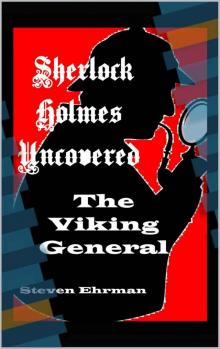 The Viking General (A Sherlock Holmes Uncovered Tale Book 9)
The Viking General (A Sherlock Holmes Uncovered Tale Book 9)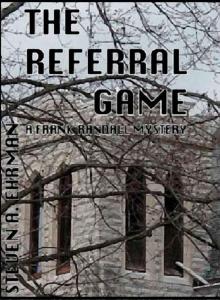 The Referral Game (A Frank Randall Mystery)
The Referral Game (A Frank Randall Mystery) Collection of Four Short Stories
Collection of Four Short Stories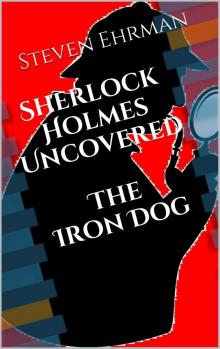 The Iron Dog (A Sherlock Holmes Uncovered Tale)
The Iron Dog (A Sherlock Holmes Uncovered Tale)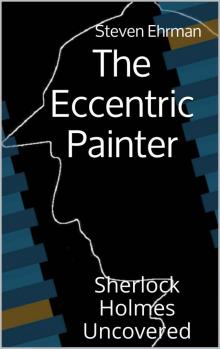 The Eccentric Painter (A Sherlock Holmes Uncovered Tale)
The Eccentric Painter (A Sherlock Holmes Uncovered Tale)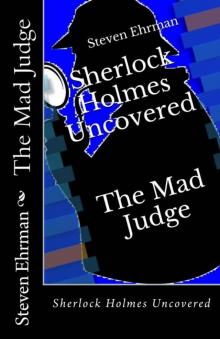 The Mad Judge (A Sherlock Holmes Uncovered Tale Book 3)
The Mad Judge (A Sherlock Holmes Uncovered Tale Book 3)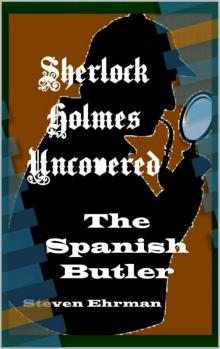 The Spanish Butler (A Sherlock Holmes Uncovered Tale Book 8)
The Spanish Butler (A Sherlock Holmes Uncovered Tale Book 8)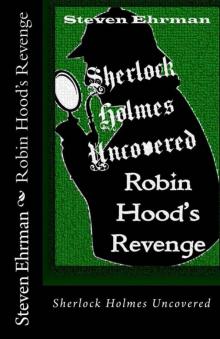 Robin Hood's Revenge (A Sherlock Holmes Uncovered Tale Book 7)
Robin Hood's Revenge (A Sherlock Holmes Uncovered Tale Book 7)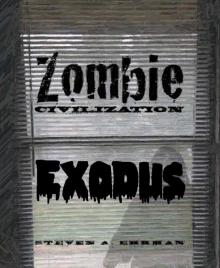 Zombie Civilization: Exodus (Zombie Civilization Saga Book 2)
Zombie Civilization: Exodus (Zombie Civilization Saga Book 2)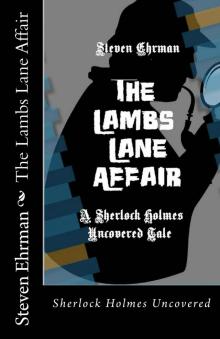 The Lambs Lane Affair (A Sherlock Holmes Uncovered Tale Book 5)
The Lambs Lane Affair (A Sherlock Holmes Uncovered Tale Book 5)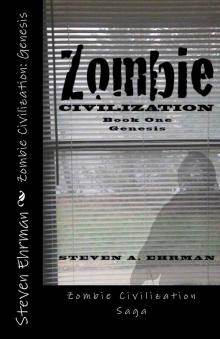 Zombie Civilization: Genesis (Zombie Civilization Saga)
Zombie Civilization: Genesis (Zombie Civilization Saga)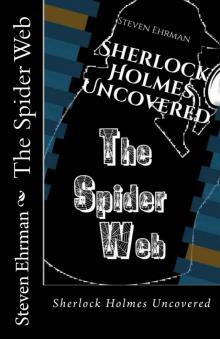 The Spider Web (A Sherlock Holmes Uncovered Tale Book 4)
The Spider Web (A Sherlock Holmes Uncovered Tale Book 4)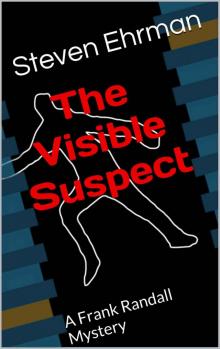 The Visible Suspect (A Frank Randall Mystery)
The Visible Suspect (A Frank Randall Mystery)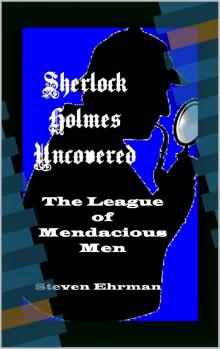 The League of Mendacious Men (A Sherlock Holmes Uncovered Tale Book 10)
The League of Mendacious Men (A Sherlock Holmes Uncovered Tale Book 10)